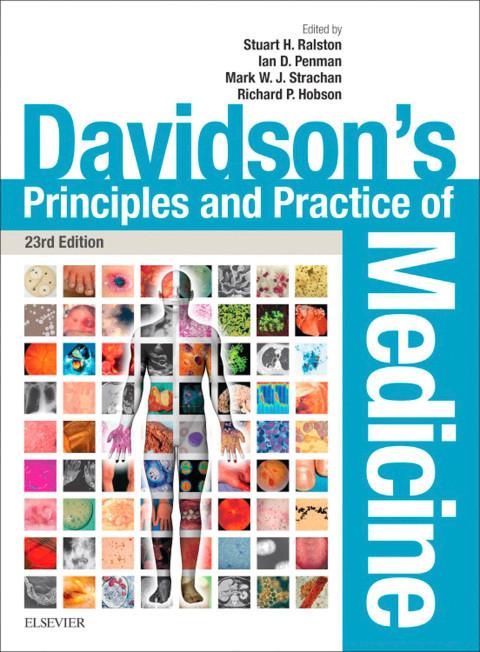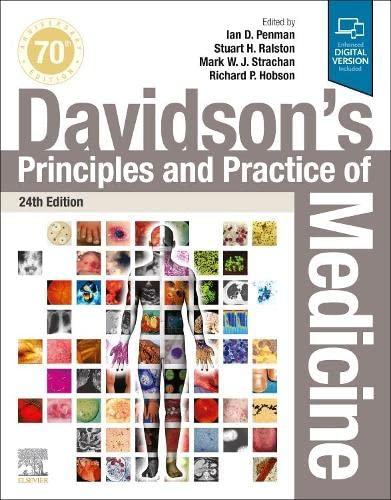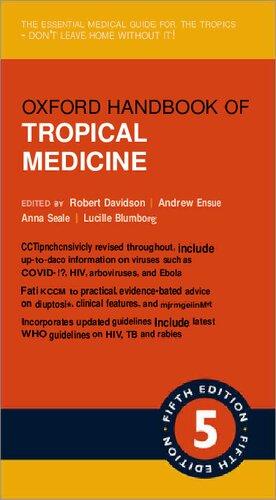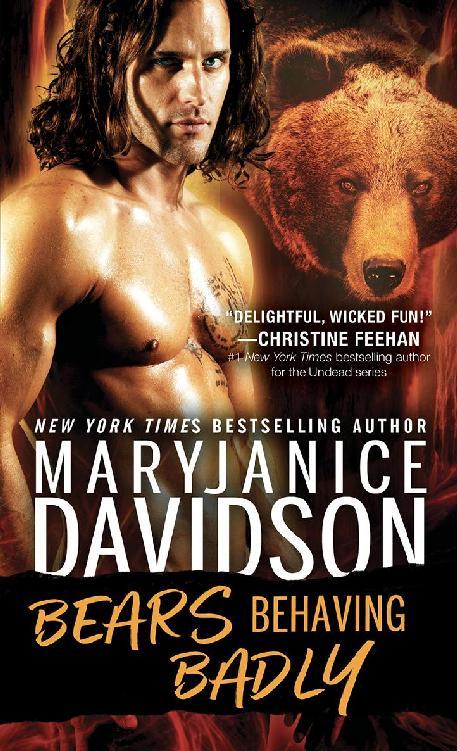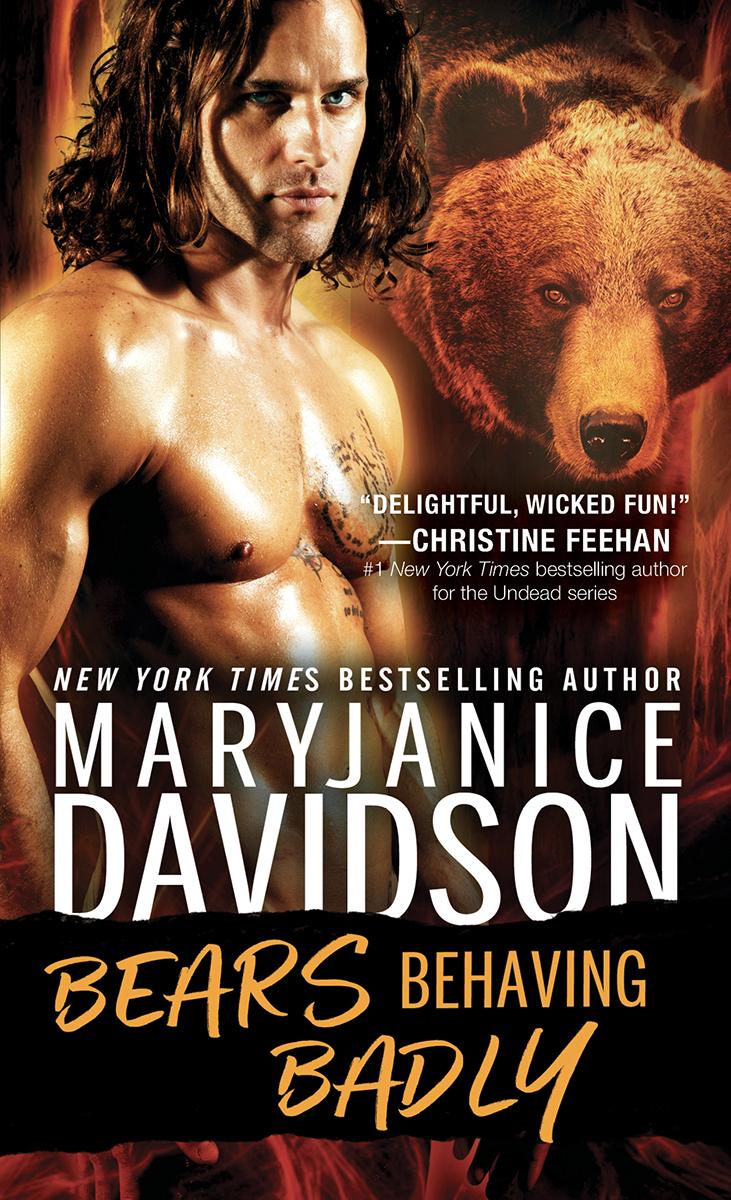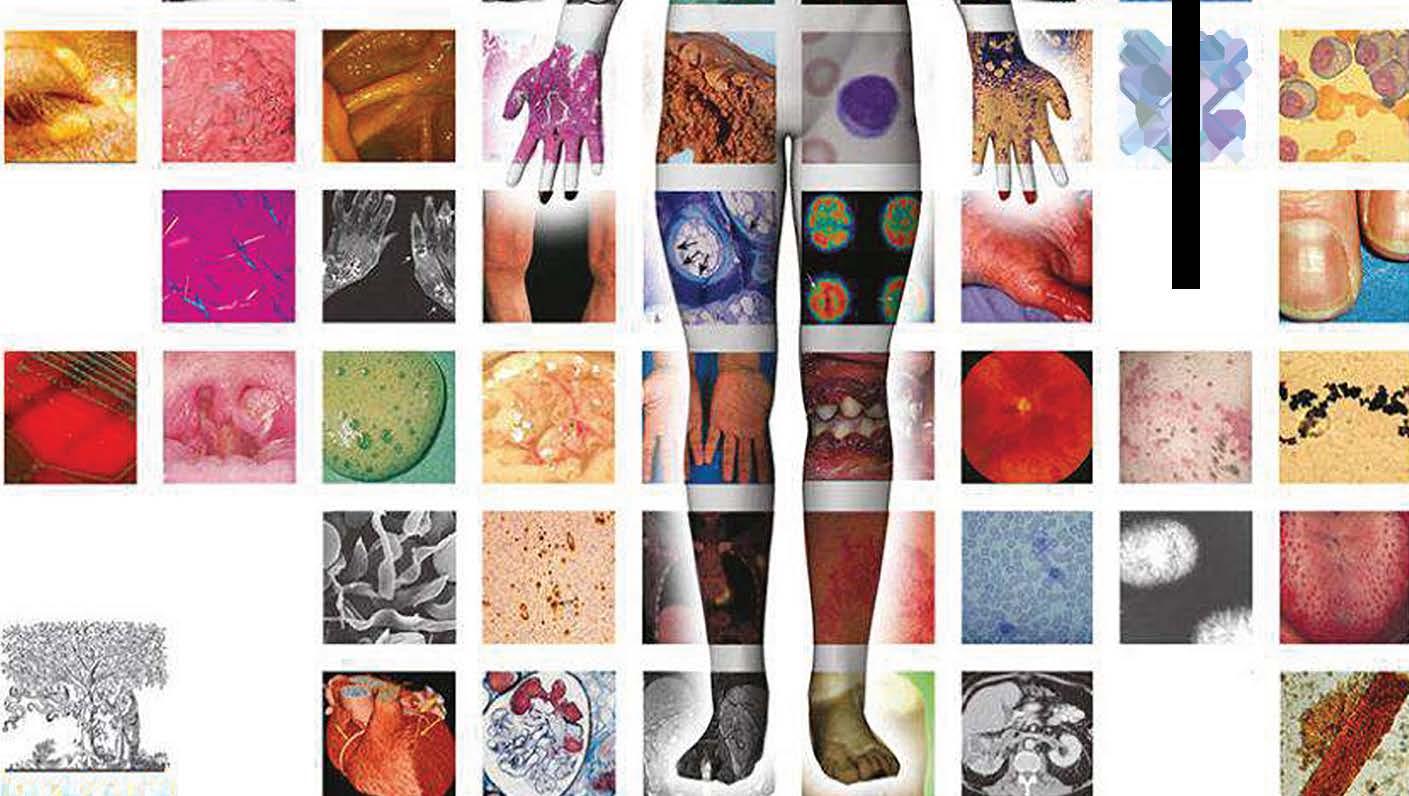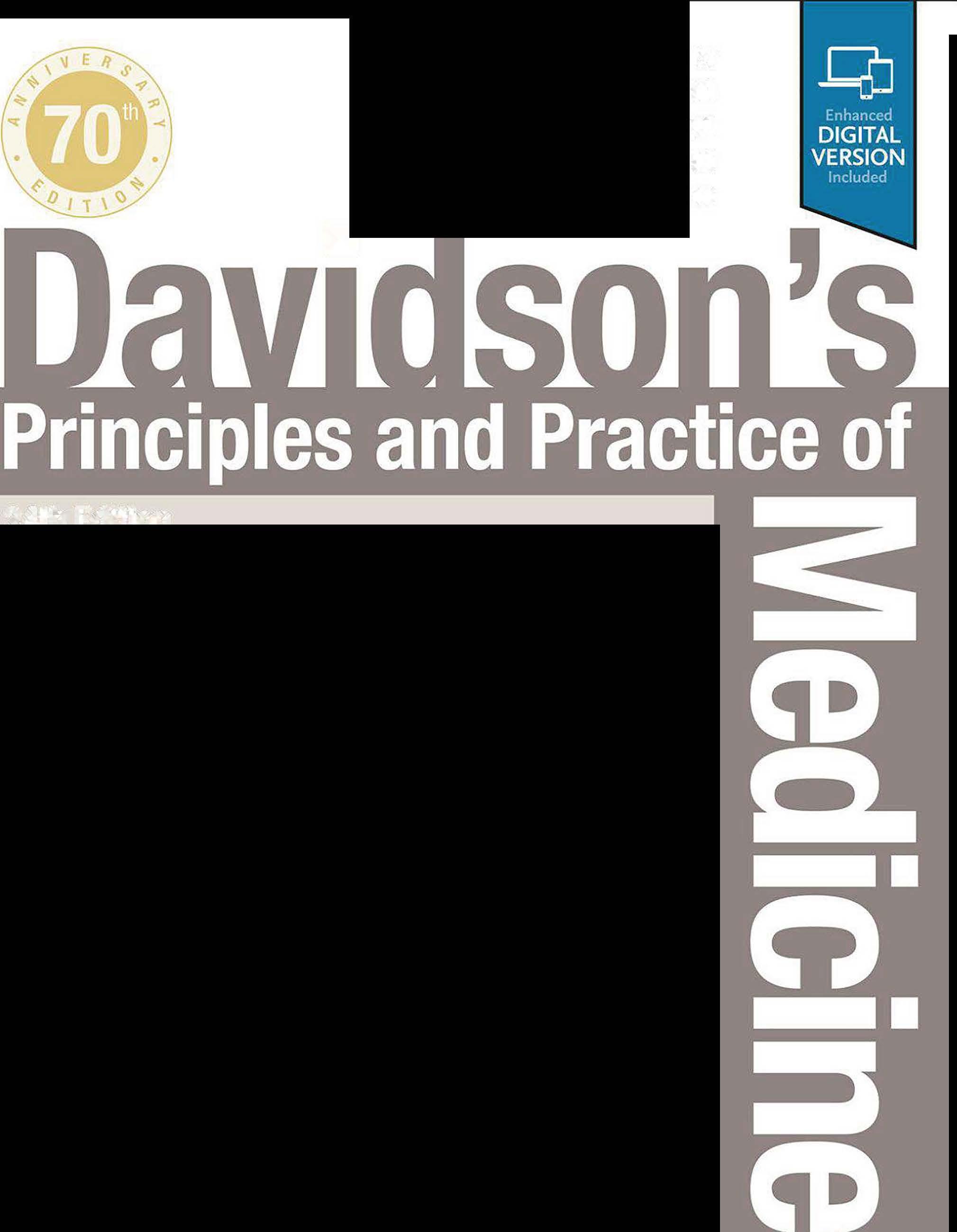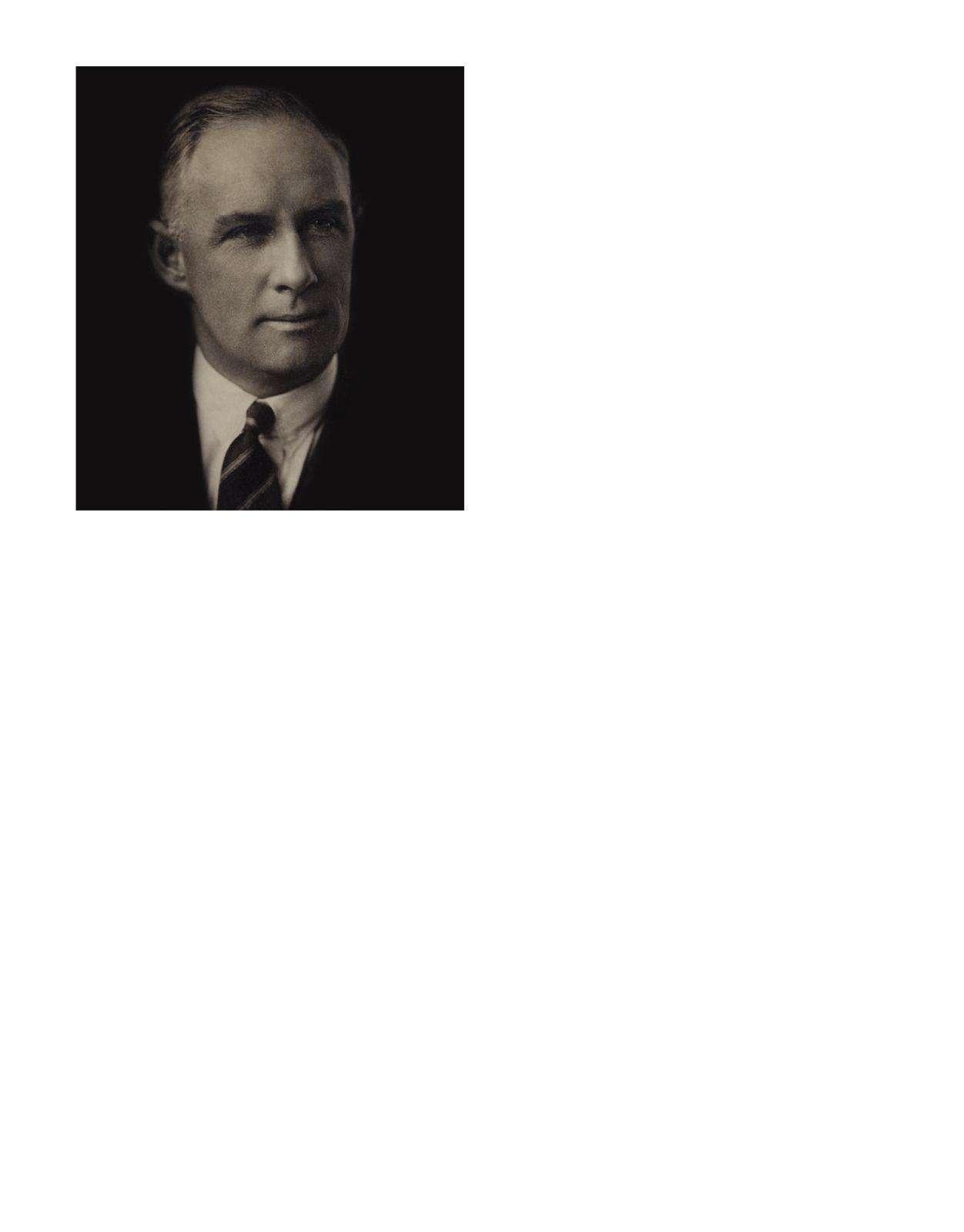M e d i c i n e Davidson’s Principles and Practice of
Edited by
Ian D Penman
BSc(Hons), MBChB, MD, FRCPE
Consultant Gastroenterologist, Royal Inrmary of Edinburgh; Honorary Senior Lecturer, University of Edinburgh, UK
Stuart H Ralston
MBChB, MD, FRCP, FMedSci, FRSE, FFPM(Hon)
Professor of Rheumatology, Centre for Genomic and Experimental Medicine, Institute of Genetics and Cancer University of Edinburgh; Honorary Consultant Rheumatologist, Western General Hospital, Edinburgh, UK
Mark WJ Strachan
BSc(Hons), MBChB(Hons), MD, FRCPE
Consultant Endocrinologist, Metabolic Unit, Western General Hospital, Edinburgh; Honorary Professor, University of Edinburgh, UK
Richard P Hobson
MBBS, LLM, PhD, MRCP(UK), FRCPath
Consultant Microbiologist, Harrogate and District NHS Foundation Trust; Honorary Senior Lecturer, University of Leeds, UK
Illustrations by Robert Britton
©2023,ElsevierLimited.Allrightsreserved.
IllustrationsandboxesinChapter11©JulianWhite.
Firstedition1952
Secondedition1954
Thirdedition1956
Fourthedition1958
Fifthedition1960
Sixthedition1962
Seventhedition1964
Eighthedition1966
Ninthedition1968
Tenthedition1971
Eleventhedition1974
Twelfthedition1977
Thirteenthedition1981
Fourteenthedition1984
Fifteenthedition1987
Sixteenthedition1991
Seventeenthedition1995
Eighteenthedition1999
Nineteenthedition2002
Twentiethedition2006
Twenty-rstedition2010
Twenty-secondedition2014
Twenty-thirdedition2018
Twenty-fourthedition2022
Nopartofthispublicationmaybereproducedortransmittedinanyformorbyanymeans,electronicormechanical, includingphotocopying,recording,oranyinformationstorageandretrievalsystem,withoutpermissioninwritingfrom thepublisher.Detailsonhowtoseekpermission,furtherinformationaboutthePublisher’spermissionspoliciesand ourarrangementswithorganizationssuchastheCopyrightClearanceCenterandtheCopyrightLicensingAgency, canbefoundatourwebsite: www.elsevier.com/permissions
This book and the individual contributions contained in it are protected under copyright by the Publisher (other than asmaybenotedherein).
Notices
Practitionersandresearchersmustalwaysrelyontheirownexperienceandknowledgeinevaluatingandusingany information,methods,compoundsorexperimentsdescribedherein.Becauseofrapidadvancesinthemedical sciences,inparticular,independentvericationofdiagnosesanddrugdosagesshouldbemade.Tothefullestextent ofthelaw,noresponsibilityisassumedbyElsevier,authors,editorsorcontributorsforanyinjuryand/ordamageto personsorpropertyasamatterofproductsliability,negligenceorotherwise,orfromanyuseoroperationofany methods,products,instructions,orideascontainedinthematerialherein.
ISBN: 978-0-7020-8347-1
InternationalISBN:978-0-7020-8348-8
PrintedintheUK
Lastdigitistheprintnumber: 9 8 7 6 5 4 3 2 1
ContentStrategist: JeremyBowes
ContentDevelopmentSpecialist: SiânJarman
ProjectManager: AnneCollett
Design: MilesHitchen
IllustrationManager: NarayananRamakrishnan
MarketingManager: KathleenPatton
Redeem your unique e-content PIN code today (see inside front cover) to access:
The complete, downloadable eBook – for quick reference, anytime access
BONUS NEW self-assessment material – 166 interactive questions and answers supplement each chapter, to help test your understanding of key points and aid exam preparation
This page intentionally left blank
Well over 2.5 million copies of Davidson’s Principles and Practice of Medicine have been sold since it was rst published in 1952. Now in its 24th Edition, Davidson’s is regarded as a ‘must-have’ textbook for thousandsofmedicalstudents,doctorsandhealthprofessionalsacross the world, describing the pathophysiology and clinical features of the most important conditions encountered in the major specialties of adult medicine and explaining how to investigate, diagnose and manage them. The book is the winner of numerous prizes and awards and has been translated into many languages. Taking its origins from Sir Stanley Davidson’smuch-admiredlecturenotes,thebookhasenduredbecause it continues to keep pace with how modern medicine is taught and to provide a wealth of information in an easy-to-read, concise and beautifullyillustratedformat.
Davidson’s strives to ensure that readers can not only recognise the clinicalfeaturesofadisease,butalsounderstandtheunderlyingcauses. To achieve this, each chapter begins with a summary of the relevant pre-clinical science, linking pathophysiology with clinical presentation and treatment so that students can use the book from the start of their medicalstudiesrightthroughtotheirnalexaminationsandbeyond.
The regular introduction of new authors and editors is important for maintaining freshness. On this occasion, 21 new authors have joined our existing contributors to make up an outstanding team of authorities in their respective elds. As well as recruiting authors from around the globe,particularlyfortopicssuchasinfectiousdiseases,HIVandenvenomation,wewelcomemembersfrom10countriesontoourInternational Advisory Board. These leading experts provide detailed comments that are crucial to our revision of each new edition. A particularly important aspect in planning the revision is for the editors to meet students and faculty in medical schools in those countries where the book is most widely read, so that we can respond to the feedback of our global readershipandtheirtutors.Weusethisfeedback,alongwiththeinformation wegatherviadetailedstudentreviewsandsurveys,tocrafteachedition.
The authors, editors and publishing team aim to ensure that readers all overtheworldarebestservedbyabookthatintegratesmedicalscience with clinical medicine to convey key knowledge and practical advice in anaccessibleandreadableformat.Theamountofdetailistailoredtothe needs of medical students working towards their nal examinations, as well as candidates preparing for Membership of the Royal Colleges of Physicians(MRCP)oritsequivalent.
With this new edition we have introduced several changes in both structureandcontent.Theopeningeightchaptersprovideanaccountof the principles of genetics, immunology, infectious diseases, population health, oncology and pain management, along with a discussion of the core principles behind clinical decision-making and good prescribing.
Subsequentchaptersdiscussmedicalemergenciesinpoisoning,envenomationandmedicineinaustereenvironments,whilecommonpresentations in acute medicine, including recognition and management of the critically ill patient, are also addressed. The disease-specic chapters that follow cover the major medical specialties, each one thoroughly revised and updated to ensure that readers have access to the ‘cutting edge’ of medical knowledge and practice. As we publish the 24th edition, the world is in the grip of the COVID-19 pandemic and while our knowledge of virology, epidemiology, clinical impact and management of SARS-CoV-2 is still evolving, we have dedicated a new section on core aspects of this hugely important topic in Chapter 13, but also in Chapter6and,asappropriate,elsewherethroughoutthebook.
The innovations introduced in recent editions have been maintained and,inmanycases,developed.Thehighlypopular‘ClinicalExamination’ overviewshavebeenextendedandupdated.The‘PresentingProblems’ sectionscontinuetoprovideaninvaluableoverviewofthemostcommon presentationsineachdiseasearea.The‘Emergency’and‘PracticePoint’ boxes have been retained along with the ‘In Old Age’, ‘In Pregnancy’ and ‘In Adolescence’ boxes, which emphasise key practical points in thepresentationandmanagementoftheolderadult,womenwithmedical disorders who are pregnant or planning pregnancy, and adolescents transitioningbetweenpaediatricandadultservices.
Education is achieved by assimilating information from many sources andreadersofthisbookcanenhancetheirlearningexperiencebyusing severalcomplementaryresources.Wedevelopedaself-testingcompanion book entitled Davidson’s Assessment in Medicine, containing over 1250 multiple choice questions specically tailored to the contents of Davidson’s for the 23rd edition and have added more new online MCQs to accompany this edition. The long-standing association of Davidson’s with its sister books, Macleod’s Clinical Examination and Principles and Practice of Surgery,stillholdsgood.Our‘family’hasalsoexpandedwith the publication of Davidson’s Essentials of Medicine, a pocket-sized version of the main text, now in its 3rd edition; and Macleod’s Clinical Diagnosis, which describes a systematic approach to the differential diagnosis of symptoms and signs. We congratulate the editors and authorsofthesebooksforcontinuingthetraditionofeasilydigestedand expertlyillustratedtexts.
We all take immense pride in continuing the great tradition rst establishedbySirStanleyDavidsonandinproducinganoutstandingbookfor thenextgenerationofdoctors.
IDP,SHR,MWJS,RPH Edinburgh2022
This page intentionally left blank
BrianJAngus MD,FRCP,DTM&H AssociateProfessor,NufeldDepartmentofMedicine, OxfordUniversity,Oxford,UK
AdamCBaker BM,BMedSci(Hons),MScExMed Pre-HospitalEmergencyMedicineFellow,HonorarySeniorClinical ResearchFellow,DepartmentofEmergencyMedicine, UniversityHospitalsPlymouthNHSTrust,DevonAirAmbulance, UniversityofExeter,Devon,UK
JamesGBoyle MBChB,MD,MSc,FRCP ConsultantDiabetologist,DepartmentofDiabetes,Endocrinologyand ClinicalPharmacology,GlasgowRoyalInrmary;HonoraryAssociate ClinicalProfessor,SchoolofMedicine,DentistryandNursing, UniversityofGlasgow,Glasgow,UK
HarryCampbell MBChB,MD,FRCPE,FFPH,FRSE,FMedSci ProfessorofGeneticEpidemiologyandPublicHealth, CentreforGlobalHealth,UsherInstitute,UniversityofEdinburgh, Edinburgh,UK
TheanSoonChew MBChB,MRCP,PhD ConsultantGastroenterologistandHonorarySeniorLecturerin Gastroenterology,AcademicUnitofGastroenterology, UniversityofShefeld,Shefeld,UK
IanJClifton MD,FRCP
ConsultantRespiratoryPhysicianandHonorarySeniorLecturer, DepartmentofRespiratoryMedicine,StJames’sUniversityHospital, Leeds,UK
SallyClive BMedSci(Hons),MBChB,MD,FRCPE ConsultantMedicalOncologist,EdinburghCancerCentre,Western GeneralHospital,Edinburgh,UK
GavinPRClunie MD,FRCP ConsultantRheumatologistandMetabolicBonePhysician, DepartmentofRheumatology,CambridgeUniversityHospitalNHS FoundationTrust,Addenbrooke’sHospital,Cambridge,UK
DanielJClutterbuck BSc(Hons),FRCP ConsultantinGenitourinaryandHIVMedicine,NHSLothian; ChalmersSexualHealthCentre,Edinburgh,UK
LesleyAColvin MBChB,PhD,FRCA,FFPMRCA,FRCPE
ProfessorofPainMedicine,DivisionofPopulationHealth andGenomics,UniversityofDundeeSchoolofMedicine, Dundee,UK
Contributors
MylesDConnor MBBCh,FCP(SA),FCNeurol(SA),PhD,FRCPE ConsultantNeurologist,DepartmentofNeurology,NHSBorders, Melrose,UK;HonorarySeniorLecturer,CentreforClinicalBrain Sciences,UniversityofEdinburgh,Edinburgh,UK;HonorarySenior Researcher,SchoolofPublicHealth, UniversityoftheWitwatersrand,Johannesburg,SouthAfrica
BryanConway MB,MRCP,PhD SeniorLecturerandHonoraryConsultantNephrologist,Departmentof RenalMedicine,UniversityofEdinburghandEdinburghRoyalInrmary, Edinburgh,UK
NicolaCooper MBChB,MMedSci,FRCPE,FRACP,FAcadMEd, SFHEA
ConsultantPhysicianandClinicalAssociateProfessorinMedical Education,DepartmentforAcuteInternalMedicine,UniversityHospitals ofDerby&BurtonNHSFoundationTrust,Derby,UK
AlisonLCracknell MBChB,FRCP ConsultantinMedicineforOlderPeople,DepartmentofMedicinefor OlderPeople,LeedsTeachingHospitalsNHSTrust;HonoraryClinical AssociateProfessor,UniversityofLeeds,Leeds,UK
DominicJCulligan BSc,MD,FRCP,FRCPath ConsultantHaematologistandHonorarySeniorLecturer, DepartmentofHaematology,AberdeenRoyalInrmary, Aberdeen,UK
DavidHDockrell MD,FRCPI,FRCPG,FACP ChairofInfectionMedicine,CentreforInammationResearch, UniversityofEdinburgh;ProfessorofInfectionMedicine, UoECentreforInammationResearch,UniversityofEdinburgh, Edinburgh,UK
DeborahABEllames BSc(Hons),MBChB ConsultantPhysicianinRespiratoryMedicine,Departmentof RespiratoryMedicine,LeedsTeachingHospitalsNHSTrust,Leeds,UK
MarieFallon MBChB,MD,FRCPG,FRCPE,DCH,DRCOG, MRCGP StColumba’sHospiceChairofPalliativeMedicine,EdinburghCancer ResearchCentre,InstituteforGeneticsandCancer,Universityof Edinburgh,Edinburgh,UK
FraserWGibb MBChB,BSc(Hons),FRCP,PhD ConsultantPhysician/HonoraryClinicalReader,EdinburghCentrefor EndocrinologyandDiabetes,RoyalInrmaryofEdinburgh/ UniversityofEdinburgh,Edinburgh,UK
TimothyTGordon-Walker MBChB,PhD,MRCP ConsultantHepatologist,DepartmentofGastroenterologyand ScottishLiverTransplantUnit,TheRoyalInrmaryofEdinburgh, Edinburgh,UK
NeilRGrubb MD,FRCP
ConsultantinCardiologyandCardiacElectrophysiology, DepartmentofCardiology,RoyalInrmaryofEdinburgh,Edinburgh,UK
DavidPJHunt MBBChir,PhD,FRCP
WellcomeSeniorClinicalFellow,DepartmentofClinicalBrainSciences, UniversityofEdinburgh,Edinburgh,UK
SallyHIbbotson BSc(Hons),MD,FRCPE ProfessorofPhotodermatology,UniversityofDundee;Honorary ConsultantDermatologistandHeadofPhotobiologyUnit, NinewellsHospitalandMedicalSchool,Dundee,UK
SaraJJenks MBChB,MRCP,FRCPath ConsultantinMetabolicMedicine,DepartmentofClinicalBiochemistry, RoyalInrmaryofEdinburgh,Edinburgh,UK
SarahLJohnston FRCP,FRCPath ConsultantImmunologist,DepartmentofImmunologyand Immunogenetics,NorthBristolNHSTrust,Bristol,UK
StephenMLawrie MD(Hons),FRCPsych,HonFRCPE,FRSE ProfessorofPsychiatryandNeuroimaging,DivisionofPsychiatry, CentreforClinicalBrainSciences,UniversityofEdinburgh, Edinburgh,UK
MichaelEJLean MA,MB,BChir,MD,FRCP,FRSE ProfessorofHumanNutrition,HumanNutrition,UniversityofGlasgow, Glasgow,UK
GaryMaartens MBChB,MMed,FCP(SA) ChairofClinicalPharmacology,DepartmentofMedicine, UniversityofCapeTown,CapeTown,SouthAfrica
LucyHMackillop BMBCh,MA(Oxon),FRCP ConsultantObstetricPhysician,OxfordUniversityHospitals, NHSFoundationTrust;HonorarySeniorClinicalLecturer, NufeldDepartmentofWomen’sandReproductiveHealth, UniversityofOxford,Oxford,UK
MichaelJMacMahon FRCA,EDIC ConsultantIntensivist,DepartmentofAnaesthesiaandIntensiveCare, VictoriaHospital,Kirkcaldy,UK
RebeccaJMann BMedSci,BMBS,MRCP,FRCPCh ConsultantPaediatrician,DepartmentofPaediatrics,Tauntonand SomersetNHSFoundationTrust,Taunton,UK
LynnMManson MBChB,MD ConsultantHaematologist,DepartmentofTransfusionMedicine, RoyalInrmaryofEdinburgh,Edinburgh,UK
AmandaMather MBBS,FRACP,PhD RenalStaffSpecialist,DepartmentofRenalMedicine,RoyalNorth ShoreHospital;ConjointSeniorLecturer,FacultyofMedicine, UniversityofSydney,Sydney,NSW,Australia
SimonRJMaxwell MD,PhD,FRCP,FRCPE,FBPhS ProfessorofStudentLearning(ClinicalPharmacologyandPrescribing), ClinicalPharmacologyUnit,UniversityofEdinburgh,Edinburgh,UK
DavidAMcAllister MBChB,MPH,MD,MRCP,MFPH WellcomeTrustIntermediateClinicalFellowandBeitFellowand HonoraryConsultantinPublicHealthMedicine,InstituteofHealthand Wellbeing,UniversityofGlasgow,Glasgow,UK
EveMiller-Hodges MBChB,PhD SeniorClinicalLecturerandHonoraryConsultantinInheritedMetabolic DisordersandRenalMedicine,CentreforCardiovascularScience& ScottishIMDService,UniversityofEdinburgh,Edinburgh,UK
FrancescaEMNeuberger MBChB,FRCP ConsultantPhysicianinAcuteandObstetricMedicine,MedicalDivision, NorthBristolNHSTrust,Bristol,UK
DavidENewby BABSc(Hons),PhD,BMDMDSc,FRSE,FESC, FACC,FMedSci BritishHeartFoundationDukeofEdinburghChairofCardiology,Centre forCardiovascularScience,UniversityofEdinburgh,Edinburgh,UK
JohnDCNewell-Price MA,PhD,FRCP ProfessorofEndocrinology,DepartmentofOncologyandMetabolism, UniversityofShefeld,Shefeld,UK
JohnAOlson MD,FRCPE,FRCOphth ConsultantOphthalmicPhysician,AberdeenRoyalInrmary;Honorary Reader,UniversityofAberdeen,Aberdeen,UK
JohnRPetrie BSc,MBChB,PhD,FRCPE,FRCPG ProfessorofDiabeticMedicine,InstituteofCardiovascularandMedical Sciences,UniversityofGlasgow,Glasgow,UK
PaulJPhelan MD,FRCPE ConsultantNephrologistandRenalTransplantPhysician, DepartmentofNephrology,RoyalInrmaryofEdinburgh,Edinburgh,UK
TerenceJQuinn FRCP,MD,MBChB,BSc SeniorClinicalLecturerandHonoraryConsultantinGeriatricMedicine, InstituteofCardiovascularandMedicalSciences,Universityof Glasgow,Glasgow,UK
StuartHRalston MBChB,MD,FRCP,FFPM(Hon),FMedSci,FRSE ProfessorofRheumatology,CentreforGenomicandExperimental Medicine,InstituteofGeneticsandCancer,UniversityofEdinburgh, WesternGeneralHospital,Edinburgh,UK
AnupamRej MBChB,BMedSci(Hons),MRCP(UK) ClinicalResearchFellow,AcademicUnitofGastroenterology, RoyalHallamshireHospital,Shefeld,UK
DavidSSanders MBChB,MD,FACG ProfessorofGastroenterology,AcademicUnitofGastroenterology, RoyalHallamshireHospitalandUniversityofShefeld,Shefeld,UK
JonathanATSandoe FRCPath,PhD AssociateClinicalProfessor,ConsultantMicrobiologist, DepartmentofMicrobiology,UniversityofLeedsand LeedsTeachingHospitalsNHSTrust,Leeds,UK
AlanGShand MD,FRCPE ConsultantGastroenterologist,GastrointestinalUnit, WesternGeneralHospital,Edinburgh,UK
MarkStares MBBS,MD(Res),MRes,BSc,MRCP MedicalOncologist,EdinburghCancerCentre,WesternGeneral Hospital,NHSLothian,Edinburgh,UK
RobbyMSteel MA,MD,FRCPsych
ConsultantLiaisonPsychiatristandHonorary(Clinical)SeniorLecturer inPsychiatry,DepartmentofPsychologicalMedicine,RoyalInrmaryof Edinburgh,Edinburgh,UK
GrantDStewart BSc,MBChB,PhDEdin,MACantab, FRCSE(Urol)
ProfessorofSurgicalOncology,DepartmentofSurgery, UniversityofCambridge,Cambridge,andHonoraryConsultant UrologicalSurgeon,Addenbrooke’sHospital,Cambridge,UK
DavidRSullivan MBBS,FRACP,FRCPA,FCSANZ HeadofDepartment,DepartmentofChemicalPathology, NSWHealthPathology,Sydney,NSW,Australia
ShyamSundar MD,FRCP,FAMS,FASc,FNA
DistinguishedProfessor,DepartmentofMedicine,InstituteofMedical Sciences,BanarasHinduUniversity,Varanasi,India
VictoriaRTallentire MBChB,MD,FRCP
Consultant Acute Physician and Associate Postgraduate Dean, Medical Directorate, NHS Education for Scotland, Edinburgh, UK
KatrinaTatton-Brown BMBCh,BA,MD ProfessorofClinicalGeneticsandGenomicEducationandConsultant inClinicalGenetics,SouthWestThamesRegionalGeneticsService, StGeorge’sUniversityHospitalsNHSFoundationTrust,London,UK
SimonHLThomas BSc,MD,FRCP,FRCPE,FEAPCCT,FACCT ProfessorofClinicalPharmacologyandTherapeutics, TranslationalandClinicalResearchInstitute,NewcastleUniversity, Newcastle-upon-Tyne,UK
HenryGWatson MD,FRCP,FRCPath ConsultantHaematologistandHonoraryProfessorofMedicine, DepartmentofHaematology,AberdeenRoyalInrmary,Aberdeen,UK
JulianWhite MD,FACTM ClinicalToxinologistandHeadofToxinology,ToxinologyDepartment andUniversityofAdelaideDepartmentofPaediatrics, Women’s&Children’sHospital,NorthAdelaide,SA,Australia
WilliamWhiteley BA,BMBCh,MSc,PhD,FRCP ReaderinNeurology,CentreforClinicalBrainSciences, UniversityofEdinburgh,Edinburgh,UK; SeniorResearchFellow,NufeldDepartmentofPopulationHealth, UniversityofOxford,Oxford,UK
MichaelJWilliams BMBCh,PhD ConsultantHepatologist,ScottishLiverTransplantUnit,RoyalInrmary ofEdinburgh,Edinburgh,UK
RebeccaWoodeld MA,MBBChir,MRCP,PhD ConsultantGeriatricianandStrokePhysician,DepartmentofMedicine fortheElderly,WesternGeneralHospital,Edinburgh,UK
This page intentionally left blank
Another random document with no related content on Scribd:
“J’avoië fait en ce voiaigë
Et je li di, ‘Ma damë s’ai-je
Pour vous ëu maint souvenir’;
Mais je ne sui pas bien hardis
De vous remonstrer, damë chierë,
Par quel art ne par quel manierë,
J’ai ëu ce comencëment
De l’amourous atouchëment ’ ”
If we try Philippe Mouskes, a mechanical rhymer, if ever there was one, and therefore the surer not to let go the leading-strings of rule, the result is the same.
But Chaucer, it is argued, was not uniform in his practice. Would this be likely? Certainly not with those terminations (like courtesië) which are questioned, and in diphthongs generally. Dante took precisely the same liberties.
“Facea le stelle a noi parer più radi,”
“Nè fu per fantasia giammai compreso”
“Poi piovve dentro all ‘alta fantasia, ”
“Solea valor e cortesia trovarsi,”
“Che ne ’nvogliava amor e cortesia ”
Here we have fantasì’ and fantasiä, cortesì’ and cortesiä. Even Pope has promiscuous, obsequious, as trisyllables, individual as a quadrisyllable, and words like tapestry, opera, indifferently as trochees or dactyls according to their place in the verse. Donne even goes so far as to make Cain a monosyllable and dissyllable in the same verse:—
“Sister and wife to Cain, Caïn that first did plough.”
The cæsural pause (a purely imaginary thing in accentual metres) may be made to balance a line like this of Donne’s,
“Are they not like | singers at doors for meat,”
but we defy any one by any trick of voice to make it supply a missing syllable in what is called our heroic measure, so mainly used by Chaucer.
Enough and far more than enough on a question about which it is as hard to be patient as about the authorship of Shakespeare’s plays. It is easy to find all manner of bad metres among these versifiers, and plenty of inconsistencies, many or most of them the fault of careless or ignorant transcribers, but whoever has read them thoroughly, and with enough philological knowledge of cognate languages to guide him, is sure that they at least aimed at regularity, precisely as he is convinced that Raynouard’s rule about singular and plural terminations has plenty of evidence to sustain it, despite the numerous exceptions. To show what a bad versifier could make out of the same language that Chaucer used, I copy one stanza from a contemporary poem.
“When Phebus fresh was in chare resplendent, In the moneth of May erly in a morning, I hard two lovers profer this argument In the yeere of our Lord a M. by rekening, CCCXL. and VIII. yeere following. O potent princesse conserve true lovers all And grant them thy region and blisse celestial.”[23]
Here is riding-rhyme, and on a very hard horse too. Can any one be insensible to the difference between such stuff as this and the measure of Chaucer? Is it possible that with him the one halting verse should be the rule, and the twenty musical ones the exception? Let us take heed to his own words:—
“And, for there is so great diversitë In English, and in writing of our tong, So pray I God[24] that none miswritë the Ne the mismetre for defaut of tong, And redde whereso thou be or ellës song That thou be understood God I beseech.”
Yet more. Boccaccio’s ottava rima is almost as regular as that of Tasso. Was Chaucer unconscious of this? It will be worth while to compare a stanza of the original with one of the translation.
“Era cortese Ettore di natura
Però vedendo di costei il gran pianto, Ch’era più bella ch’altra creatura, Con pio parlare confortolla alquanto, Dicendo, lascia con la ria ventura
Tuo padre andar che tulti ha offeso tanto, E tu, sicura e lieta, senza noia, Mentre t’aggrada, con noi resta in Troia ”[25]
“Now was this Hector pitous of naturë, And saw that she was sorrowful begon And that she was so faire a creaturë, Of his goodnesse he gladed her anon And said [saidë] let your father’s treason gon Forth with mischance, and ye yourself in joy Dwelleth with us while [that] you list in Troy.”
If the Italian were read with the same ignorance that has wreaked itself on Chaucer, the riding-rhyme would be on its high horse in almost every line of Boccaccio’s stanza. The same might be said of many a verse in Donne’s satires. Spenser in his eclogues for February, May, and September evidently took it for granted that he had caught the measure of Chaucer, and it would be rather amusing, as well as instructive, to hear the maintainers of the hopskip-and-jump theory of versification attempt to make the elder poet’s verses dance to the tune for which one of our greatest metrists (in his philological deafness) supposed their feet to be trained.
I will give one more example of Chaucer’s verse, again making my selection from one of his less mature works. He is speaking of Tarquin:—
“And ay the morë he was in despair
The more he coveted and thought her fair; His blinde lust was all his coveting.
On morrow when the bird began to sing Unto the siege he cometh full privily
And by himself he walketh soberly
The imáge of her recording alway new: Thus lay her hair, and thus fresh was her hue, Thus sate, thus spake, thus span, this was her cheer, Thus fair she was, and this was her manére All this conceit his heart hath new ytake, And as the sea, with tempest all toshake, That after, when the storm is all ago, Yet will the water quap a day or two, Right so, though that her forme were absént, The pleasance of her forme was presént.”
And this passage leads me to say a few words of Chaucer as a descriptive poet; for I think it a great mistake to attribute to him any properly dramatic power, as some have done. Even Herr Hertzberg, in his remarkably intelligent essay, is led a little astray on this point by his enthusiasm. Chaucer is a great narrative poet; and, in this species of poetry, though the author’s personality should never be obtruded, it yet unconsciously pervades the whole, and communicates an individual quality, —a kind of flavor of its own. This very quality, and it is one of the highest in its way and place, would be fatal to all dramatic force. The narrative poet is occupied with his characters as picture, with their grouping, even their costume, it may be, and he feels for and with them instead of being they for the moment, as the dramatist must always be. The story-teller must possess the situation perfectly in all its details, while the imagination of the dramatist must be possessed and mastered by it. The latter puts before us the very passion or emotion itself in its utmost intensity; the former gives them, not in their primary form, but in that derivative one which they have acquired by passing through his own mind and being modified by his reflection. The deepest pathos of the drama, like the quiet “no more but so?” with which Shakespeare tells us that Ophelia’s heart is bursting, is sudden as a stab, while in narrative it is more or less suffused with pity,—a feeling capable of prolonged sustention. This presence of the author’s own sympathy is noticeable in all Chaucer’s pathetic passages, as, for instance,
in the lamentation of Constance over her child in the “Man of Law’s Tale.” When he comes to the sorrow of his story, he seems to croon over his thoughts, to soothe them and dwell upon them with a kind of pleased compassion, as a child treats a wounded bird which he fears to grasp too tightly, and yet cannot make up his heart wholly to let go. It is true also of his humor that it pervades his comic tales like sunshine, and never dazzles the attention by a sudden flash. Sometimes he brings it in parenthetically, and insinuates a sarcasm so slyly as almost to slip by without our notice, as where he satirizes provincialism by the cock
“Who knew by nature each ascensiön Of the equinoctial in his native town.”
Sometimes he turns round upon himself and smiles at a trip he has made into fine writing:—
“Till that the brightë sun had lost his hue, For th’ orisont had reft the sun his light, (This is as much to sayen as ‘it was night.’)”
Nay, sometimes it twinkles roguishly through his very tears, as in the “ ‘Why wouldest thou be dead,’ these women cry, ‘Thou haddest gold enough and Emily?’ ”
that follows so close upon the profoundly tender despair of Arcite’s farewell:—
“What is this world? What asken men to have? Now with his love now in the coldë grave Alone withouten any company!”
The power of diffusion without being diffuse would seem to be the highest merit of narration, giving it that easy flow which is so delightful. Chaucer’s descriptive style is remarkable for its lowness of tone,—for that combination of energy with simplicity which is among the rarest gifts in literature. Perhaps all is said in saying that he has style at all, for that consists mainly in the absence of undue emphasis and exaggeration, in the
clear uniform pitch which penetrates our interest and retains it, where mere loudness would only disturb and irritate.
Not that Chaucer cannot be intense, too, on occasion; but it is with a quiet intensity of his own, that comes in as it were by accident.
“Upon a thickë palfrey, paper-white, With saddle red embroidered with delight, Sits Dido: And she is fair as is the brightë morrow That healeth sickë folk of nightës sorrow Upon a courser startling as the fire, Æneas sits ”
Pandarus, looking at Troilus,
“Took up a light and found his countenance As for to look upon an old romance.”
With Chaucer it is always the thing itself and not the description of it that is the main object. His picturesque bits are incidental to the story, glimpsed in passing; they never stop the way. His key is so low that his high lights are never obtrusive. His imitators, like Leigh Hunt, and Keats in his “Endymion,” missing the nice gradation with which the master toned everything down, become streaky. Hogarth, who reminds one of him in the variety and natural action of his figures, is like him also in the subdued brilliancy of his coloring. When Chaucer condenses, it is because his conception is vivid. He does not need to personify Revenge, for personification is but the subterfuge of unimaginative and professional poets; but he embodies the very passion itself in a verse that makes us glance over our shoulder as if we heard a stealthy tread behind us:—
“The smiler with the knife hid under the cloak.”[26]
And yet how unlike is the operation of the imaginative faculty in him and Shakespeare! When the latter describes, his epithets imply always an impression on the moral sense (so to speak) of the person who hears or sees. The sun “flatters the mountain-tops with sovereign eye”; the bending “weeds lacquey the dull stream”; the shadow of the falcon “coucheth the fowl below”; the smoke is “helpless”; when Tarquin enters the chamber of
Lucrece “the threshold grates the door to have him heard.” His outward sense is merely a window through which the metaphysical eye looks forth, and his mind passes over at once from the simple sensation to the complex meaning of it,—feels with the object instead of merely feeling it. His imagination is forever dramatizing. Chaucer gives only the direct impression made on the eye or ear. He was the first great poet who really loved outward nature as the source of conscious pleasurable emotion. The Troubadour hailed the return of spring; but with him it was a piece of empty ritualism. Chaucer took a true delight in the new green of the leaves and the return of singing birds,—a delight as simple as that of Robin Hood:—
“In summer when the shaws be sheen, And leaves be large and long, It is full merry in fair forest
To hear the small birds’ song ”
He has never so much as heard of the “burthen and the mystery of all this unintelligible world.” His flowers and trees and birds have never bothered themselves with Spinoza. He himself sings more like a bird than any other poet, because it never occurred to him, as to Goethe, that he ought to do so. He pours himself out in sincere joy and thankfulness. When we compare Spenser’s imitations of him with the original passages, we feel that the delight of the later poet was more in the expression than in the thing itself. Nature with him is only good to be transfigured by art. We walk among Chaucer’s sights and sounds; we listen to Spenser’s musical reproduction of them. In the same way, the pleasure which Chaucer takes in telling his stories has in itself the effect of consummate skill, and makes us follow all the windings of his fancy with sympathetic interest. His best tales run on like one of our inland rivers, sometimes hastening a little and turning upon themselves in eddies that dimple without retarding the current; sometimes loitering smoothly, while here and there a quiet thought, a tender feeling, a pleasant image, a golden-hearted verse, opens quietly as a water-lily, to float on the surface without breaking it into ripple. The vulgar intellectual palate hankers after the titillation of foaming phrase, and thinks nothing good for much that does not go off with a pop like a champagne cork. The mellow suavity of more precious vintages seems insipid: but the taste, in proportion as it refines, learns to appreciate the indefinable flavor, too subtile for analysis. A manner has prevailed of late in which every other
word seems to be underscored as in a school-girl’s letter. The poet seems intent on showing his sinew, as if the power of the slim Apollo lay in the girth of his biceps. Force for the mere sake of force ends like Milo, caught and held mockingly fast by the recoil of the log he undertook to rive. In the race of fame, there are a score capable of brilliant spurts for one who comes in winner after a steady pull with wind and muscle to spare. Chaucer never shows any signs of effort, and it is a main proof of his excellence that he can be so inadequately sampled by detached passages,—by single lines taken away from the connection in which they contribute to the general effect. He has that continuity of thought, that evenly prolonged power, and that delightful equanimity, which characterize the higher orders of mind. There is something in him of the disinterestedness that made the Greeks masters in art. His phrase is never importunate. His simplicity is that of elegance, not of poverty. The quiet unconcern with which he says his best things is peculiar to him among English poets, though Goldsmith, Addison, and Thackeray have approached it in prose. He prattles inadvertently away, and all the while, like the princess in the story, lets fall a pearl at every other word. It is such a piece of good luck to be natural! It is the good gift which the fairy godmother brings to her prime favorites in the cradle. If not genius, it is alone what makes genius amiable in the arts. If a man have it not, he will never find it, for when it is sought it is gone.
When Chaucer describes anything, it is commonly by one of those simple and obvious epithets or qualities that are so easy to miss. Is it a woman? He tells us she is fresh; that she has glad eyes; that “every day her beauty newed”; that
“Methought all fellowship as naked Withouten her that I saw once, As a coróne without the stones.”
Sometimes he describes amply by the merest hint, as where the Friar, before setting himself softly down, drives away the cat. We know without need of more words that he has chosen the snuggest corner. In some of his early poems he sometimes, it is true, falls into the catalogue style of his contemporaries; but after he had found his genius he never particularizes too much,—a process as deadly to all effect as an explanation to a pun. The first stanza of the “Clerk’s Tale” gives us a landscape whose stately choice
of objects shows a skill in composition worthy of Claude, the last artist who painted nature epically:—
“There is at the west endë of Itaile, Down at the foot of Vesulus the cold, A lusty plain abundant of vitaile, Where many a tower and town thou may’st behold That founded were in time of fathers old, And many another delítable sight; And Sàlucës this noble country hight.”
The Pre-Raphaelite style of landscape entangles the eye among the obtrusive weeds and grass-blades of the foreground which, in looking at a real bit of scenery, we overlook; but what a sweep of vision is here! and what happy generalization in the sixth verse as the poet turns away to the business of his story! The whole is full of open air.
But it is in his characters, especially, that his manner is large and free; for he is painting history, though with the fidelity of portrait. He brings out strongly the essential traits, characteristic of the genus rather than of the individual. The Merchant who keeps so steady a countenance that
“There wist no wight that he was e’er in debt,”
the Sergeant at Law, “who seemëd busier than he was,” the Doctor of Medicine, whose “study was but little on the Bible,”—in all these cases it is the type and not the personage that fixes his attention. William Blake says truly, though he expresses his meaning somewhat clumsily, “the characters of Chaucer’s Pilgrims are the characters which compose all ages and nations. Some of the names and titles are altered by time, but the characters remain forever unaltered, and consequently they are the physiognomies and lineaments of universal human life, beyond which Nature never steps. Names alter, things never alter. As Newton numbered the stars, and as Linnæus numbered the plants, so Chaucer numbered the classes of men.” In his outside accessaries, it is true, he sometimes seems as minute as if he were illuminating a missal. Nothing escapes his sure eye for the picturesque,—the cut of the beard, the soil of armor on the buff jerkin, the rust on the sword, the expression of the eye. But in this he has an artistic purpose. It is here that he individualizes, and, while every touch harmonizes
with and seems to complete the moral features of the character, makes us feel that we are among living men, and not the abstracted images of men. Crabbe adds particular to particular, scattering rather than deepening the impression of reality, and making us feel as if every man were a species by himself; but Chaucer, never forgetting the essential sameness of human nature, makes it possible, and even probable, that his motley characters should meet on a common footing, while he gives to each the expression that belongs to him, the result of special circumstance or training. Indeed, the absence of any suggestion of caste cannot fail to strike any reader familiar with the literature on which he is supposed to have formed himself. No characters are at once so broadly human and so definitely outlined as his. Belonging, some of them, to extinct types, they continue contemporary and familiar forever. So wide is the difference between knowing a great many men and that knowledge of human nature which comes of sympathetic insight and not of observation alone.
It is this power of sympathy which makes Chaucer’s satire so kindly,— more so, one is tempted to say, than the panegyric of Pope. Intellectual satire gets its force from personal or moral antipathy, and measures offences by some rigid conventional standard. Its mouth waters over a galling word, and it loves to say Thou, pointing out its victim to public scorn. Indignatio facit versus, it boasts, though they might as often be fathered on envy or hatred. But imaginative satire, warmed through and through with the genial leaven of humor, smiles half sadly and murmurs We. Chaucer either makes one knave betray another, through a natural jealousy of competition, or else expose himself with a naïveté of good-humored cynicism which amuses rather than disgusts. In the former case the butt has a kind of claim on our sympathy; in the latter, it seems nothing strange if the sunny atmosphere which floods that road to Canterbury should tempt anybody to throw off one disguise after another without suspicion. With perfect tact, too, the Host is made the choragus in this diverse company, and the coarse jollity of his temperament explains, if it does not excuse, much that would otherwise seem out of keeping. Surely nobody need have any scruples with him.
Chaucer seems to me to have been one of the most purely original of poets, as much so in respect of the world that is about us as Dante in respect of that which is within us. There had been nothing like him before, there has been nothing since. He is original, not in the sense that he thinks and says what nobody ever thought and said before, and what nobody can ever think
and say again, but because he is always natural, because, if not always absolutely new, he is always delightfully fresh, because he sets before us the world as it honestly appeared to Geoffrey Chaucer, and not a world as it seemed proper to certain people that it ought to appear. He found that the poetry which had preceded him had been first the expression of individual feeling, then of class feeling as the vehicle of legend and history, and at last had wellnigh lost itself in chasing the mirage of allegory. Literature seemed to have passed through the natural stages which at regular intervals bring it to decline. Even the lyrics of the jongleurs were all run in one mould, and the Pastourelles of Northern France had become as artificial as the Pastorals of Pope. The Romances of chivalry had been made over into prose, and the Melusine of his contemporary Jehan d’Arras is the forlorn hope of the modern novel. Arrived thus far in their decrepitude, the monks endeavored to give them a religious and moral turn by allegorizing them. Their process reminds one of something Ulloa tells us of the fashion in which the Spaniards converted the Mexicans: “Here we found an old man in a cavern so extremely aged as it was wonderful, which could neither see nor go because he was so lame and crooked. The Father, Friar Raimund, said it were good (seeing he was so aged) to make him a Christian; whereupon we baptized him.” The monks found the Romances in the same stage of senility, and gave them a saving sprinkle with the holy water of allegory. Perhaps they were only trying to turn the enemy’s own weapons against himself, for it was the free-thinking “Romance of the Rose” that more than anything else had made allegory fashionable. Plutarch tells us that an allegory is to say one thing where another is meant, and this might have been needful for the personal security of Jean de Meung, as afterwards for that of his successor, Rabelais. But, except as a means of evading the fagot, the method has few recommendations. It reverses the true office of poetry by making the real unreal. It is imagination endeavoring to recommend itself to the understanding by means of cuts. If an author be in such deadly earnest, or if his imagination be of such creative vigor as to project real figures when it meant to cast only a shadow upon vapor; if the true spirit come, at once obsequious and terrible, when the conjurer has drawn his circle and gone through with his incantations merely to produce a proper frame of mind in his audience, as was the case with Dante, there is no longer any question of allegory as the word and thing are commonly understood. But with all secondary poets, as with Spenser for example, the
allegory does not become of one substance with the poetry, but is a kind of carven frame for it, whose figures lose their meaning, as they cease to be contemporary. It was not a style that could have much attraction for a nature so sensitive to the actual, so observant of it, so interested by it as that of Chaucer. He seems to have tried his hand at all the forms in vogue, and to have arrived in his old age at the truth, essential to all really great poetry, that his own instincts were his safest guides, that there is nothing deeper in life than life itself, and that to conjure an allegorical significance into it was to lose sight of its real meaning. He of all men could not say one thing and mean another, unless by way of humorous contrast.
In thus turning frankly and gayly to the actual world, and drinking inspiration from sources open to all; in turning away from a colorless abstraction to the solid earth and to emotions common to every pulse; in discovering that to make the best of nature, and not to grope vaguely after something better than nature, was the true office of Art; in insisting on a definite purpose, on veracity, cheerfulness, and simplicity, Chaucer shows himself the true father and founder of what is characteristically English literature. He has a hatred of cant as hearty as Dr. Johnson’s, though he has a slier way of showing it; he has the placid common-sense of Franklin, the sweet, grave humor of Addison, the exquisite taste of Gray; but the whole texture of his mind, though its substance seem plain and grave, shows itself at every turn iridescent with poetic feeling like shot silk. Above all, he has an eye for character that seems to have caught at once not only its mental and physical features, but even its expression in variety of costume,—an eye, indeed, second only, if it should be called second in some respects, to that of Shakespeare.
I know of nothing that may be compared with the prologue to the “Canterbury Tales,” and with that to the story of the “Chanon’s Yeoman” before Chaucer. Characters and portraits from real life had never been drawn with such discrimination, or with such variety, never with such bold precision of outline, and with such a lively sense of the picturesque. His Parson is still unmatched, though Dryden and Goldsmith have both tried their hands in emulation of him. And the humor also in its suavity, its perpetual presence and its shy unobtrusiveness, is something wholly new in literature. For anything that deserves to be called like it in English we must wait for Henry Fielding.
Chaucer is the first great poet who has treated To-day as if it were as good as Yesterday, the first who held up a mirror to contemporary life in its infinite variety of high and low, of humor and pathos. But he reflected life in its large sense as the life of men, from the knight to the ploughman,—the life of every day as it is made up of that curious compound of human nature with manners. The very form of the “Canterbury Tales” was imaginative. The garden of Boccaccio, the supper-party of Grazzini, and the voyage of Giraldi make a good enough thread for their stories, but exclude all save equals and friends, exclude consequently human nature in its wider meaning. But by choosing a pilgrimage, Chaucer puts us on a plane where all men are equal, with souls to be saved, and with another world in view that abolishes all distinctions. By this choice, and by making the Host of the Tabard always the central figure, he has happily united the two most familiar emblems of life,—the short journey and the inn. We find more and more as we study him that he rises quietly from the conventional to the universal, and may fairly take his place with Homer in virtue of the breadth of his humanity.
In spite of some external stains, which those who have studied the influence of manners will easily account for without imputing them to any moral depravity, we feel that we can join the pure-minded Spenser in calling him “most sacred, happy spirit.” If character may be divined from works, he was a good man, genial, sincere, hearty, temperate of mind, more wise, perhaps, for this world than the next, but thoroughly humane, and friendly with God and men. I know not how to sum up what we feel about him better than by saying (what would have pleased most one who was indifferent to fame) that we love him more even than we admire. We are sure that here was a true brother-man so kindly that, in his “House of Fame,” after naming the great poets, he throws in a pleasant word for the oaten-pipes
“Of the little herd-grooms That keepen beasts among the brooms.”
No better inscription can be written on the first page of his works than that which he places over the gate in his “Assembly of Fowls,” and which contrasts so sweetly with the stern lines of Dante from which they were imitated:—
“Through me men go into the blissful place Of the heart’s heal and deadly woundës’ cure; Through me men go unto the well of Grace, Where green and lusty May doth ever endure; This is the way to all good aventure; Be glad, thou Reader, and thy sorrow offcast, All open am I, pass in, and speed thee fast!”
LIBRARY OF OLD AUTHORS.[27]
MANY of our older readers can remember the anticipation with which they looked for each successive volume of the late Dr. Young’s excellent series of old English prose-writers, and the delight with which they carried it home, fresh from the press and the bindery in its appropriate livery of evergreen. To most of us it was our first introduction to the highest society of letters, and we still feel grateful to the departed scholar who gave us to share the conversation of such men as Latimer, More, Sidney, Taylor, Browne, Fuller, and Walton. What a sense of security in an old book which Time has criticised for us! What a precious feeling of seclusion in having a double wall of centuries between us and the heats and clamors of contemporary literature! How limpid seems the thought, how pure the old wine of scholarship that has been settling for so many generations in those silent crypts and Falernian amphoræ of the Past! No other writers speak to us with the authority of those whose ordinary speech was that of our translation of the Scriptures; to no modern is that frank unconsciousness possible which was natural to a period when yet reviews were not; and no later style breathes that country charm characteristic of days ere the metropolis had drawn all literary activity to itself, and the trampling feet of the multitude had banished the lark and the daisy from the fresh privacies of language. Truly, as compared with the present, these old voices seem to come from the morning fields and not the paved thoroughfares of thought.
Even the “Retrospective Review” continues to be good reading, in virtue of the antique aroma (for wine only acquires its bouquet by age) which pervades its pages. Its sixteen volumes are so many tickets of admission to the vast and devious vaults of the sixteenth and seventeenth centuries, through which we wander, tasting a thimbleful of rich Canary, honeyed Cyprus, or subacidulous Hock, from what dusty butt or keg our fancy chooses. The years during which this review was published were altogether the most fruitful in genuine appreciation of old English literature. Books were prized for their imaginative and not their antiquarian value by young writers who sate at the feet of Lamb and Coleridge. Rarities of style, of thought, of fancy, were sought, rather than the barren scarcities of
typography. But another race of men seems to have sprung up, in whom the futile enthusiasm of the collector predominates, who substitute archæologic perversity for fine-nerved scholarship, and the worthless profusion of the curiosity-shop for the sifted exclusiveness of the cabinet of Art. They forget, in their fanaticism for antiquity, that the dust of never so many centuries is impotent to transform a curiosity into a gem, that only good books absorb mellowness of tone from age, and that a baptismal register which proves a patriarchal longevity (if existence be life) cannot make mediocrity anything but a bore, or garrulous commonplace entertaining. There are volumes which have the old age of Plato, rich with gathering experience, meditation, and wisdom, which seem to have sucked color and ripeness from the genial autumns of all the select intelligences that have steeped them in the sunshine of their love and appreciation;—these quaint freaks of russet tell of Montaigne; these stripes of crimson fire, of Shakespeare; this sober gold, of Sir Thomas Browne; this purpling bloom, of Lamb; in such fruits we taste the legendary gardens of Alcinoüs and the orchards of Atlas; and there are volumes again which can claim only the inglorious senility of Old Parr or older Jenkins, which have outlived their half-dozen of kings to be the prize of showmen and treasuries of the bornto-be-forgotten trifles of a hundred years ago.
We confess a bibliothecarian avarice that gives all books a value in our eyes; there is for us a recondite wisdom in the phrase, “A book is a book”; from the time when we made the first catalogue of our library, in which “Bible, large, 1 vol.,” and “Bible, small, 1 vol.,” asserted their alphabetic individuality and were the sole Bs in our little hive, we have had a weakness even for those checker-board volumes that only fill up; we cannot breathe the thin air of that Pepysian self-denial, that Himalayan selectness, which, content with one bookcase, would have no tomes in it but porphyrogeniti, books of the bluest blood, making room for choicer new-comers by a continuous ostracism to the garret of present incumbents. There is to us a sacredness in a volume, however dull; we live over again the author’s lonely labors and tremulous hopes; we see him, on his first appearance after parturition, “as well as could be expected,” a nervous sympathy yet surviving between the late-severed umbilical cord and the wondrous offspring, doubtfully entering the Mermaid, or the Devil Tavern, or the Coffee-house of Will or Button, blushing under the eye of Ben or Dryden or Addison, as if they must needs know him for the author of the “Modest
Enquiry into the Present State of Dramatique Poetry,” or of the “Unities briefly considered by Philomusus,” of which they have never heard and never will hear so much as the names; we see the country-gentlemen (sole cause of its surviving to our day) who buy it as a book no gentleman’s library can be complete without; we see the spendthrift heir, whose horses and hounds and Pharaonic troops of friends, drowned in a Red Sea of claret, bring it to the hammer, the tall octavo in tree-calf following the ancestral oaks of the park. Such a volume is sacred to us. But it must be the original foundling of the book-stall, the engraved blazon of some extinct baronetcy within its cover, its leaves enshrining memorial-flowers of some passion which the churchyard smothered ere the Stuarts were yet discrowned, suggestive of the trail of laced ruffles, burnt here and there with ashes from the pipe of some dozing poet, its binding worn and weather-stained, that has felt the inquisitive finger, perhaps, of Malone, or thrilled to the touch of Lamb, doubtful between desire and the odd sixpence. When it comes to a question of reprinting, we are more choice. The new duodecimo is bald and bare, indeed, compared with its battered prototype that could draw us with a single hair of association.
It is not easy to divine the rule which has governed Mr. Smith in making the selections for his series. A choice of old authors should be a florilegium, and not a botanist’s hortus siccus, to which grasses are as important as the single shy blossom of a summer. The old-maidenly genius of antiquarianism seems to have presided over the editing of the “Library.” We should be inclined to surmise that the works to be reprinted had been commonly suggested by gentlemen with whom they were especial favorites, or who were ambitious that their own names should be signalized on the title-pages with the suffix of E�����. The volumes already published are: Increase Mather’s “Remarkable Providences”; the poems of Drummond of Hawthornden; the “Visions of Piers Ploughman;” the works in prose and verse of Sir Thomas Overbury; the “Hymns and Songs” and the “Hallelujah” of George Wither; the poems of Southwell; Selden’s “Table-Talk”; the “Enchiridion” of Quarles; the dramatic works of Marston, Webster, and Lilly; Chapman’s translation of Homer; Lovelace, and four volumes of “Early English Poetry”! The volume of Mather is curious and entertaining, and fit to stand on the same shelf with the “Magnalia” of his book-suffocated son. Cunningham’s comparatively recent edition, we should think, might satisfy for a long time to come the demand for
Drummond, whose chief value to posterity is as the Boswell of Ben Jonson. Sir Thomas Overbury’s “Characters” are interesting illustrations of contemporary manners, and a mine of foot-notes to the works of better men, —but, with the exception of “The Fair and Happy Milkmaid,” they are dull enough to have pleased James the First; his “Wife” is a cento of far-fetched conceits,—here a tomtit, and there a hen mistaken for a pheasant, like the contents of a cockney’s game-bag, and his chief interest for us lies in his having been mixed up with an inexplicable tragedy and poisoned in the Tower, not without suspicion of royal complicity. The “Piers Ploughman” is a reprint, with very little improvement that we can discover, of Mr. Wright’s former edition. It would have been very well to have republished the “Fair Virtue,” and “Shepherd’s Hunting” of George Wither, which contain all the true poetry he ever wrote; but we can imagine nothing more dreary than the seven hundred pages of his “Hymns and Songs,” whose only use, that we can conceive of, would be as penal reading for incorrigible poetasters. If a steady course of these did not bring them out of their nonsenses, nothing short of hanging would. Take this as a sample, hit on by opening at random:
“Rottenness my bones possest; Trembling fear possessèd me; I that troublous day might rest: For, when his approaches be Onward to the people made, His strong troops will them invade ”
Southwell is, if possible, worse. He paraphrases David, putting into his mouth such punning conceits as “fears are my feres,” and in his “Saint Peter’s Complaint” makes that rashest and shortest-spoken of the Apostles drawl through thirty pages of maudlin repentance, in which the distinctions between the north and northeast sides of a sentimentality are worthy of Duns Scotus. It does not follow, that, because a man is hanged for his faith, he is able to write good verses. We would almost match the fortitude that quails not at the good Jesuit’s poems with his own which carried him serenely to the fatal tree. The stuff of which poets are made, whether finer or not, is of a very different fibre from that which is used in the tough fabric of martyrs. It is time that an earnest protest should be uttered against the wrong done to the religious sentiment by the greater part of what is called
religious poetry, and which is commonly a painful something misnamed by the noun and misqualified by the adjective. To dilute David, and make doggerel of that majestic prose of the Prophets which has the glow and wide-orbited metre of constellations, may be a useful occupation to keep country-gentlemen out of litigation or retired clergymen from polemics; but to regard these metrical mechanics as sacred because nobody wishes to touch them, as meritorious because no one can be merry in their company, —to rank them in the same class with those ancient songs of the Church, sweet with the breath of saints, sparkling with the tears of forgiven penitents, and warm with the fervor of martyrs,—nay, to set them up beside such poems as those of Herbert, composed in the upper chambers of the soul that open toward the sun’s rising, is to confound piety with dulness, and the manna of heaven with its sickening namesake from the apothecary’s drawer. The “Enchiridion” of Quarles is hardly worthy of the author of the “Emblems,” and is by no means an unattainable book in other editions,— nor a matter of heartbreak, if it were. Of the dramatic works of Marston and Lilly it is enough to say that they are truly works to the reader, but in no sense dramatic, nor, as literature, worth the paper they blot. They seem to have been deemed worthy of republication because they were the contemporaries of true poets; and if all the Tuppers of the nineteenth century will buy their plays on the same principle, the sale will be a remunerative one. It was worth while, perhaps, to reprint Lovelace, if only to show what dull verses may be written by a man who has made one lucky hit. Of the “Early English Poetry,” nine tenths had better never have been printed at all, and the other tenth reprinted by an editor who had some vague suspicion, at least, of what they meant. The Homer of Chapman is so precious a gift, that we are ready to forgive all Mr. Smith’s shortcomings in consideration of it. It is a vast placer, full of nuggets for the philologist and the lover of poetry.
Having now run cursorily through the series of Mr. Smith’s reprints, we come to the closer question of How are they edited? Whatever the merit of the original works, the editors, whether self-elected or chosen by the publisher, should be accurate and scholarly. The editing of the Homer we can heartily commend; and Dr. Rimbault, who carried the works of Overbury through the press, has done his work well; but the other volumes of the Library are very creditable neither to English scholarship nor to English typography. The Introductions to some of them are enough to make
us think that we are fallen to the necessity of reprinting our old authors because the art of writing correct and graceful English has been lost. William B. Turnbull, Esq., of Lincoln’s Inn, Barrister at Law, says, for instance, in his Introduction to Southwell: “There was resident at Uxendon, near Harrow on the Hill, in Middlesex, a Catholic family of the name of Bellamy whom [which] Southwell was in the habit of visiting and providing with religious instruction when he exchanged his ordinary [ordinarily] close confinement for a purer atmosphere.” (p. xxii.) Again, (p. xxii,) “He had, in this manner, for six years, pursued, with very great success, the objects of his mission, when these were abruptly terminated by his foul betrayal into the hands of his enemies in 1592.” We should like to have Mr. Turnbull explain how the objects of a mission could be terminated by a betrayal, however it might be with the mission itself. From the many similar flowers in the Introduction to Mather’s “Providences,” by Mr. George Offor, (in whom, we fear, we recognize a countryman,) we select the following: “It was at this period when, [that,] oppressed by the ruthless hand of persecution, our Pilgrim Fathers, threatened with torture and death, succumbed not to man, but trusting on [in] an almighty arm, braved the dangers of an almost unknown ocean, and threw themselves into the arms of men called savages, who proved more beneficent than national Christians.” To whom or what our Pilgrim Fathers did succumb, and what “national Christians” are, we leave, with the song of the Sirens, to conjecture. Speaking of the “Providences,” Mr. Offor says, that “they faithfully delineate the state of public opinion two hundred years ago, the most striking feature being an implicit faith in the power of the [in-]visible world to hold visible intercourse with man:—not the angels to bless poor erring mortals, but of demons imparting power to witches and warlocks to injure, terrify and destroy,”—a sentence which we defy any witch or warlock, though he were Michael Scott himself, to parse with the astutest demonic aid. On another page, he says of Dr. Mather, that “he was one of the first divines who discovered that very many strange events, which were considered preternatural, had occurred in the course of nature or by deceitful juggling; that the Devil could not speak English, nor prevail with Protestants; the smell of herbs alarms the Devil; that medicine drives out Satan!” We do not wonder that Mr. Offor put a mark of exclamation at the end of this surprising sentence, but we do confess our astonishment that the vermilion pencil of the proof-reader suffered it to pass unchallenged.
Leaving its bad English out of the question, we find, on referring to Mather’s text, that he was never guilty of the absurdity of believing that Satan was less eloquent in English than in any other language; that it was the British (Welsh) tongue which a certain demon whose education had been neglected (not the Devil) could not speak; that Mather is not fool enough to say that the Fiend cannot prevail with Protestants, nor that the smell of herbs alarms him, nor that medicine drives him out. Anything more helplessly inadequate than Mr. Offor’s preliminary dissertation on Witchcraft we never read; but we could hardly expect much from an editor whose citations from the book he is editing show that he had either not read or not understood it.
Mr. Offor is superbly Protestant and iconoclastic,—not sparing, as we have seen, even Priscian’s head among the rest; but, en revanche, Mr. Turnbull is ultramontane beyond the editors of the Civiltà Cattolica. He allows himself to say, that, “after Southwell’s death, one of his sisters, a Catholic in heart, but timidly and blamably simulating heresy, wrought, with some relics of the martyr, several cures on persons afflicted with desperate and deadly diseases, which had baffled the skill of all physicians.” Mr. Turnbull is, we suspect, a recent convert, or it would occur to him that doctors are still secure of a lucrative practice in countries full of the relics of greater saints than even Southwell. That father was hanged (according to Protestants) for treason, and the relic which put the whole pharmacopœia to shame was, if we mistake not, his neckerchief. But whatever the merits of the Jesuit himself, and however it may gratify Mr. Turnbull’s catechumenical enthusiasm to exalt the curative properties of this integument of his, even at the expense of Jesuits’ bark, we cannot but think that he has shown a credulity that unfits him for writing a fair narrative of his hero’s life, or making a tolerably just estimate of his verses. It is possible, however, that these last seem prosaic as a necktie only to heretical readers.
We have singled out the Introductions of Messrs. Turnbull and Offor for special animadversion because they are on the whole the worst, both of them being offensively sectarian, while that of Mr. Offor in particular gives us almost no information whatever. Some of the others are not without grave faults, chief among which is a vague declamation, especially out of place in critical essays, where it serves only to weary the reader and awaken his distrust. In his Introduction to Wither’s “Hallelujah,” for instance, Mr.
Farr informs us that “nearly all the best poets of the latter half of the sixteenth century—for that was the period when the Reformation was fully established—and the whole of the seventeenth century were sacred poets,” and that “even Shakespeare and the contemporary dramatists of his age sometimes attuned their well-strung harps to the songs of Zion.” Comment on statements like these would be as useless as the assertions themselves are absurd.
We have quoted these examples only to justify us in saying that Mr. Smith must select his editors with more care if he wishes that his “Library of Old Authors” should deserve the confidence and thereby gain the good word of intelligent readers,—without which such a series can neither win nor keep the patronage of the public. It is impossible that men who cannot construct an English sentence correctly, and who do not know the value of clearness in writing, should be able to disentangle the knots which slovenly printers have tied in the thread of an old author’s meaning; and it is more than doubtful whether they who assert carelessly, cite inaccurately, and write loosely are not by nature disqualified for doing thoroughly what they undertake to do. If it were unreasonable to demand of every one who assumes to edit one of our early poets the critical acumen, the genial sense, the illimitable reading, the philological scholarship, which in combination would alone make the ideal editor, it is not presumptuous to expect some one of these qualifications singly, and we have the right to insist upon patience and accuracy, which are within the reach of every one, and without which all the others are wellnigh vain. Now to this virtue of accuracy Mr. Offor specifically lays claim in one of his remarkable sentences: “We are bound to admire,” he says, “the accuracy and beauty of this specimen of typography. Following in the path of my late friend William Pickering, our publisher rivals the Aldine and Elzevir presses, which have been so universally admired.” We should think that it was the product of those presses which had been admired, and that Mr. Smith presents a still worthier object of admiration when he contrives to follow a path and rival a press at the same time. But let that pass;—it is the claim to accuracy which we dispute; and we deliberately affirm, that, so far as we are able to judge by the volumes we have examined, no claim more unfounded was ever set up. In some cases, as we shall show presently, the blunders of the original work have been followed with painful accuracy in the reprint; but many others have been added by the carelessness of Mr. Smith’s printers or
editors. In the thirteen pages of Mr. Offor’s own Introduction we have found as many as seven typographical errors,—unless some of them are to be excused on the ground that Mr. Offor’s studies have not yet led him into those arcana where we are taught such recondite mysteries of language as that verbs agree with their nominatives. In Mr. Farr’s Introduction to the “Hymns and Songs” nine short extracts from other poems of Wither are quoted, and in these we have found no less than seven misprints or false readings which materially affect the sense. Textual inaccuracy is a grave fault in the new edition of an old poet; and Mr. Farr is not only liable to this charge, but also to that of making blundering misstatements which are calculated to mislead the careless or uncritical reader. Infected by the absurd cant which has been prevalent for the last dozen years among literary sciolists, he says,—“The language used by Wither in all his various works—whether secular or sacred—is pure Saxon.” Taken literally, this assertion is manifestly ridiculous, and, allowing it every possible limitation, it is not only untrue of Wither, but of every English poet, from Chaucer down. The translators of our Bible made use of the German version, and a poet versifying the English Scriptures would therefore be likely to use more words of Teutonic origin than in his original compositions. But no English poet can write English poetry except in English,—that is, in that compound of Teutonic and Romanic which derives its heartiness and strength from the one and its canorous elegance from the other. The Saxon language does not sing, and, though its tough mortar serve to hold together the less compact Latin words, porous with vowels, it is to the Latin that our verse owes majesty, harmony, variety, and the capacity for rhyme. A quotation of six lines from Wither ends at the top of the very page on which Mr. Farr lays down his extraordinary dictum, and we will let this answer him, Italicizing the words of Romance derivation:—
“Her true beauty leaves behind Apprehensions in the mind, Of more sweetness than all art Or inventions can impart; Thoughts too deep to be expressed, And too strong to be suppressed.”
Mr. Halliwell, at the close of his Preface to the Works of Marston, (Vol. I. p. xxii,) says, “The dramas now collected together are reprinted absolutely from the early editions, which were placed in the hands of our printers, who thus had the advantage of following them without the intervention of a transcriber. They are given as nearly as possible in their original state, the only modernizations attempted consisting in the
alternations of the letters i and j, and u and v, the retention of which” (does Mr. Halliwell mean the letters or the “alternations”?) “would have answered no useful purpose, while it would have unnecessarily perplexed the modern reader.”
This is not very clear; but as Mr. Halliwell is a member of several learned foreign societies, and especially of the Royal Irish Academy, perhaps it would be unfair to demand that he should write clear English. As one of Mr. Smith’s editors, it was to be expected that he should not write it idiomatically. Some malign constellation (Taurus, perhaps, whose infaust aspect may be supposed to preside over the makers of bulls and blunders) seems to have been in conjunction with heavy Saturn when the Library was projected. At the top of the same page from which we have made our quotation, Mr. Halliwell speaks of “conveying a favorable impression on modern readers.” It was surely to no such phrase as this that Ensign Pistol alluded when he said, “Convey the wise it call.”
A literal reprint of an old author may be of value in two ways: the orthography may in certain cases indicate the ancient pronunciation, or it may put us on a scent which shall lead us to the burrow of a word among the roots of language. But in order to this, it surely is not needful to undertake the reproduction of all the original errors of the press; and even were it so, the proofs of carelessness in the editorial department are so glaring, that we are left in doubt, after all, if we may congratulate ourselves on possessing all these sacred blunders of the Elizabethan type-setters in their integrity, and without any debasement of modern alloy. If it be gratifying to know that there lived stupid men before our contemporary Agamemnons in that kind, yet we demand absolute accuracy in the report of the phenomena in order to arrive at anything like safe statistics. For instance, we find (Vol. I. p. 89) “A���� S�������, S���� P�����,” and (Vol. III. p. 174) “exit ambo,” and we are interested to know that in a London printing-house, two centuries and a half ago, there was a philanthropist who wished to simplify the study of the Latin language by reducing all the nouns to one gender and all the verbs to one number. Had his emancipated theories of grammar prevailed, how much easier would that part of boys which cherubs want have found the school-room benches! How would birchen bark, as an educational tonic, have fallen in repute! How white would have been the (now black-and-blue) memories of Dr. Busby and so many other educational lictors, who, with their bundles of
rods, heralded not alone the consuls, but all other Roman antiquities to us! We dare not, however, indulge in the grateful vision, since there are circumstances which lead us to infer that Mr. Halliwell himself (member though he be of so many learned societies) has those vague notions of the speech of ancient Rome which are apt to prevail in regions which count not the betula in their Flora. On page xv of his Preface, he makes Drummond say that Ben Jonson “was dilated” (delated,—Gifford gives it in English, accused) “to the king by Sir James Murray,”—Ben, whose corpulent person stood in so little need of that malicious increment!
What is Mr. Halliwell’s conception of editorial duty? As we read along, and the once fair complexion of the margin grew more and more pitted with pencil-marks, like that of a bad proof-sheet, we began to think that he was acting on the principle of every man his own washerwoman,—that he was making blunders of set purpose, (as teachers of languages do in their exercises,) in order that we might correct them for ourselves, and so fit us in time to be editors also, and members of various learned societies, even as Mr. Halliwell himself is. We fancied, that, magnanimously waving aside the laurel with which a grateful posterity crowned General Wade, he wished us “to see these roads before they were made,” and develop our intellectual muscles in getting over them. But no; Mr. Halliwell has appended notes to his edition, and among them are some which correct misprints, and therefore seem to imply that he considers that service as belonging properly to the editorial function. We are obliged, then, to give up our theory that his intention was to make every reader an editor, and to suppose that he wished rather to show how disgracefully a book might be edited and yet receive the commendation of professional critics who read with the ends of their fingers. If this were his intention, Marston himself never published so biting a satire.
Let us look at a few of the intricate passages, to help us through which Mr. Halliwell lends us the light of his editorial lantern. In the Induction to “What you Will” occurs the striking and unusual phrase, “Now out uppont,” and Mr. Halliwell favors us with the following note: “Page 221, line 10. Up-pont.—That is, upon’t.” Again in the same play we find—
“Let twattling fame cheatd others rest, I um no dish for rumors feast.”
Of course, it should read,—
“Let twattling [twaddling] Fame cheate others’ rest, I am no dish for Rumor’s feast ”
Mr. Halliwell comes to our assistance thus: “Page 244, line 21, [22 it should be,] I um,—a printer’s error for I am.” Dignus vindice nodus! Five lines above, we have “whole” for “who’ll,” and four lines below, “helmeth” for “whelmeth”; but Mr. Halliwell vouchsafes no note. In the “Fawn” we read, “Wise neads use few words,” and the editor says in a note, “a misprint for heads”! Kind Mr. Halliwell!
Having given a few examples of our “Editor’s” corrections, we proceed to quote a passage or two which, it is to be presumed, he thought perfectly clear.
“A man can skarce put on a tuckt-up cap, A button’d frizado sute, skarce eate good meate, Anchoves, caviare, but hee’s satyred And term’d phantasticall. By the muddy spawne Of slymie neughtes, when troth, phantasticknesse That which the naturall sophysters tearme Phantusia incomplexa is a function Even of the bright immortal part of man. It is the common passe, the sacred dore, Unto the prive chamber of the soule; That bar’d, nought passeth past the baser court Of outward scence by it th’inamorate Most lively thinkes he sees the absent beauties Of his lov’d mistres.” (Vol. I. p. 241.)
In this case, also, the true readings are clear enough:—
“And termed fantastical by the muddy spawn Of slimy newts”; and “ ... past the baser court Of outward sense”;
but, if anything was to be explained, why are we here deserted by our fida compagna? Again, (Vol. II. pp. 55, 56,) we read, “This Granuffo is a right wise good lord, a man of excellent discourse, and never speakes his signes to me, and men of profound reach instruct aboundantly; hee begges suites with signes, gives thanks with signes,” etc. This Granuffo is qualified among the “Interlocutors” as “a silent lord,” and what fun there is in the character (which, it must be confessed, is rather of a lenten kind) consists in his genius for saying nothing. It is plain enough that the passage should read, “a man of excellent discourse, and never speaks; his signs to me and men of profound reach instruct abundantly,” etc.
In both the passages we have quoted, it is not difficult for the reader to set the text right. But if not difficult for the reader, it should certainly not have been so for the editor, who should have done what Broome was said to have done for Pope in his Homer,—“gone before and swept the way.” An edition of an English author ought to be intelligible to English readers, and, if the editor do not make it so, he wrongs the old poet, for two centuries lapt in lead, to whose works he undertakes to play the gentleman-usher. A play written in our own tongue should not be as tough to us as Æschylus to a ten years’ graduate, nor do we wish to be reduced to the level of a chimpanzee, and forced to gnaw our way through a thick shell of misprints and mispointings only to find (as is generally the case with Marston) a rancid kernel of meaning after all. But even Marston sometimes deviates into poetry, as a man who wrote in that age could hardly help doing, and one of the few instances of it is in a speech of Erichtho, in the first scene of the fourth act of “Sophonisba,” (Vol. I. p. 197,) which Mr. Halliwell presents to us in this shape:—
“hardby the reverent (!) ruines Of a once glorious temple rear’d to Jove Whose very rubbish ...
. . . . . yet beares
A deathlesse majesty, though now quite rac’d, [razed,] Hurl’d down by wrath and lust of impious kings, So that where holy Flamins [Flamens] wont to sing Sweet hymnes to Heaven, there the daw and crow, The ill-voyc’d raven, and still chattering pye, Send out ungratefull sounds and loathsome filth; Where statues and Joves acts were vively limbs,
Where tombs and beautious urnes of well dead men Stood in assured rest,” etc.
The last verse and a half are worthy of Chapman; but why did not Mr. Halliwell, who explains up-pont and I um, change “Joves acts were vively limbs” to “Jove’s acts were lively limned,” which was unquestionably what Marston wrote?
In the “Scourge of Villanie,” (Vol. III. p. 252,) there is a passage which till lately had a modern application in America, though happily archaic in England, which Mr. Halliwell suffers to stand thus:
“Once Albion lived in such a cruel age Than man did hold by servile vilenage: Poore brats were slaves of bondmen that were borne, And marted, sold: but that rude law is torne And disannuld, as too too inhumane.”
This should read—
“Man man did hold in servile villanage; Poor brats were slaves (of bondmen that were born)”;
and perhaps some American poet will one day write in the past tense similar verses of the barbarity of his forefathers.
We will give one more scrap of Mr. Halliwell’s text:—
“Yfaith, why then, caprichious mirth, Skip, light moriscoes, in our frolick blond, Flagg’d veines, sweete, plump with fresh-infused joyes!”
which Marston, doubtless, wrote thus:—
“I’faith, why then, capricious Mirth, Skip light moriscoes in our frolic blood!
Flagg’d veins, swell plump with fresh-infused joys!”
We have quoted only a few examples from among the scores that we had marked, and against such a style of “editing” we invoke the shade of Marston himself. In the Preface to the Second Edition of the “Fawn,” he says, “Reader, know I have perused this coppy, to make some satisfaction for the first faulty impression; yet so urgent hath been my business that some errors have styll passed, which thy discretion may amend.”
Literally, to be sure, Mr. Halliwell has availed himself of the permission of the poet, in leaving all emendation to the reader; but certainly he has been false to the spirit of it in his self-assumed office of editor. The notes to explain up-pont and I um give us a kind of standard of the highest intelligence which Mr. Halliwell dares to take for granted in the ordinary reader. Supposing this nousometer of his to be a centigrade, in what hitherto unconceived depths of cold obstruction can he find his zero-point of entire idiocy? The expansive force of average wits cannot be reckoned upon, as we see, to drive them up as far as the temperate degree of misprints in one syllable, and those, too, in their native tongue. A fortiori, then, Mr. Halliwell is bound to lend us the aid of his great learning wherever his author has introduced foreign words and the old printers have made pie of them. In a single case he has accepted his responsibility as dragoman, and the amount of his success is not such as to give us any poignant regret that he has everywhere else left us to our own devices. On p. 119, Vol. II., Francischina, a Dutchwoman, exclaims, “O, mine aderliver love.” Here is Mr. Halliwell’s note. “Aderliver.—This is the speaker’s error for alderliever, the best beloved by all.” Certainly not “the speaker’s error,” for Marston was no such fool as intentionally to make a Dutchwoman blunder in her own language. But is it an error for alderliever? No, but for alderliefster. Mr. Halliwell might have found it in many an old Dutch song.
For example, No. 96 of Hoffmann von Fallersleben’s “Niederländische Volkslieder” begins thus:—
“Mijn hert altijt heeft verlanghen Naer u, die alderliefste mijn.”
But does the word mean “best beloved by all”? No such thing, of course; but “best beloved of all,”—that is, by the speaker.
In “Antonio and Mellida” (Vol. I. pp. 50, 51) occur some Italian verses, and here we hoped to fare better; for Mr. Halliwell (as we learn from the title-page of his Dictionary) is a member of the “Reale Academia di Firenze.” This is the Accademia della Crusca, founded for the conservation of the Italian language in its purity, and it is rather a fatal symptom that Mr. Halliwell should indulge in the heresy of spelling Accademia with only one c. But let us see what our Della Cruscan’s notions of conserving are. Here is a specimen:
“Bassiammi, coglier l’ aura odorata Che in sua neggia in quello dolce labra. Dammi pimpero del tuo gradit’ amore ”
It is clear enough that we ought to read,
“Lasciami coglier,.... Che ha sua seggia,.... Dammi l’ impero.”
A Della Cruscan academician might at least have corrected by his dictionary the spelling and number of labra.
We think that we have sustained our indictment of Mr. Halliwell’s text with ample proof. The title of the book should have been, “The Works of John Marston, containing all the Misprints of the Original Copies, together with a few added for the First Time in this Edition, the whole carefully let alone by James Orchard Halliwell, F. R. S., F. S. A.” It occurs to us that Mr. Halliwell may be also a Fellow of the Geological Society, and may have caught from its members the enthusiasm which leads him to attach so extraordinary a value to every goose-track of the Elizabethan formation. It is bad enough to be, as Marston was, one of those middling poets whom neither gods nor men nor columns (Horace had never seen a newspaper)

